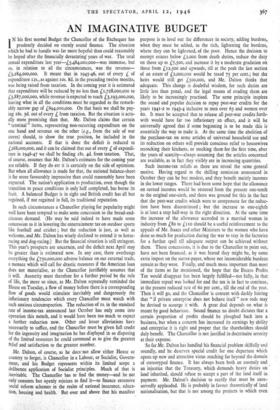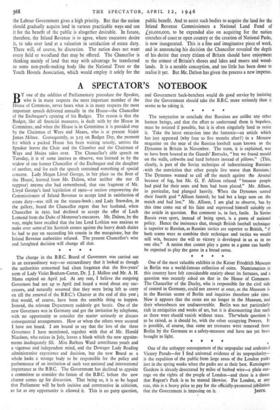AN IMAGINATIVE BUDGET
N his first normal Budget the Chancellor of the Exchequer has I prudently decided on sternly sound finance. The situation which he had to handle was far more hopeful than could reasonably be hoped after the financially devastating' years of war. The total annual expenditure last year—£5,484,000,000—was immense, but so, in relation to all the circumstances, was the revenue— £3,284,000,000. It meant that in 1945-46, out of every £ of expenditure 12s., as against sos. 8d. in the preceding twelve months, was being raised from taxation. In the coming year it is estimated that expenditure will be reduced by no less than £5,728,000,000 to £3,887,000,000, while revenue is expected to reach £3,193,000,000, leaving what in all the conditions must be regarded as the remark- ably narrow gap of L694,000,000. .0n that basis we shall be pay- ing 16s. 5d. out of every £ from taxation. But the situation is actu- ally more promising than that. Mr. Dalton claims that certain " terminal " items, representing non-recurring expenditure on the one hand and revenue on the other (e.g., from the sale of war stores) should, to show the true position, be included in the national accounts. If that is done the deficit is reduced to L268,000,000, and it can be claimed that out of every £ of expendi- ture in 1946-47 we shall be finding as. 4d. from taxation. That, of course, assumes that Mr. Dalton's estimates for the coming year are reliable. If they do err it is certainly on the side of optimism. But when all allowance is made for that, the national balance-sheet- is far more favourably impressive than could reasonably have been expected. The nation's application to production, even though the transition to peace conditions is only half completed, has borne its fruit. A balanced Budget is in sight and British credit has all but regained, if not regained in full, its traditional reputation.
In such circumstances a Chancellor playing for popularity might well have been tempted to make some concession to the bread-and- circuses demand. (He may be said indeed to have made some concession to it in lowering the entertainment tax on outdoor sports like football and cricket ; but the reduction is just, as well as welcome, and Mr. Dalton has wisely declined to extend it to horse- racing and dog-racing.) But the financial situation is still stringent. This year's prospects are uncertain, and the deficit next April may be greater than is estimated now. In any case, there overhangs everything the £750,000,000 adverse balance on our external trade, a menace which will call for drastic measures if the American loan does not materialise, as the Chancellor justifiably assumes that it will. Austerity must therefore for a further period be the rule of life, the more so since, as Mr. Dalton repeatedly reminded the House on Tuesday, a flow of money before there is a corresponding flow of goods would stimulate inevitably and dangerously the inflationary tendencies which every Chancellor must watch with such anxious circumspection. The reduction of Is. in the standard rate of income-tax announced last October has only come into operation this mdnth, and it would have been too much to expect a further reduction now. Other and lesser alleviations have necessarily to suffice, and the Chancellor must be given full credit for the ingenuity and imagination he has displayed in so disposing of the limited resources he could command as to give the greatest relief and satisfaction to the greatest number.
Mr. Dalton, of course, as he does'not allow either House or country to forget, is Chancellor in a Labour, or Socialist, Govern- ment, and his Budget represents within its limited scope a deliberate application of Socialist principles. Much of that is inevitable. The Chancellor has to find the money—and he not only-consents but openly rejoices to find it—to finance extensive social reform schemes in the realm of national insurance, educa- tion, housing and health. But over and above that his manifest purpose is to level out the differences in society, adding burdens, when they must be added, to the rich, lightening the burdens, where they can be lightened, of the poor. Hence the decision to exempt estates below £2,000 from death duties, reduce the duty on those up to L7,500, and increase it by a moderate gradation on those from £52,500 and upwards, till at the peak the last section of an estate of £2,000,000 would be taxed 75 per cent.; but the heirs would still get £500,000, and Mr. Dalton thinks that adequate. This change is doubtful wisdom, for such duties are little less than penal, and the legal means of evading them are likely to be increasingly practised. The same principle inspires the sound and popular decision to repay post-war credits for the years 1941-2 to 1943-4 inclusive to men over 65 and women over 6o. It must be accepted that to release all post-war credits forth- with would have far too inflationary an effect, and it will be universally agreed that if some beginning is to be made this is essentially the way to make it. At the same time the abolition of the purchase-tax on some articles of universal household use and its reduction on others will provide conscious relief to housewives restocking their kitchens, or stocking them for the first time, after the years of scarcity—always assuming that the articles concerned are available, as in fact they visibly are in increasing quantities.
Such income-tax reliefs as there are reveal the same general motive. Having regard to the shilling remission announced in October they can be but modest, and they benefit mainly incomes in the lower ranges. There had been some hope that the allowance on earned incomes would be restored from the present one-tenth to the original one-sixth, and there was ground for this in the fact that the post-war credits which were to compensate for the reduc- tion have been discontinued ; but the increase to one-eighth is at least a step half-way in the right direction. At the same time the increase of the allowance accorded to a married woman in industry from £80 to £I to should be a useful reinforcement to the appeals of Mr. Isaacs and other Ministers to the women who have done so much for production during the war to stay in the factories for a further spell till adequate output can be achieved without them. These concessions, it is due to the Chancellor to point out, have not been financed, as it was feared they might be, by some extra impost on the surtax-payer, whose not inconsiderable burdens remain as they were. Finally, and much more important than most of the items so far mentioned, the hope that the Excess Profits Tax would disappear has been largely fulfilled—not fully, in that immediate repeal was looked for and the tax is in fact to continue, at the present reduced rate of 6o per cent., till the end of the year. Then it will go, and the Chancellor is content with darkly hinting that " if private enterprise does not behave itself " new rods may be devised to scourge it with. A great deal depends on what is meant by good behaviour. Sound finance no doubt dictates that a certain proportion of profits should be ploughed back into a business, but when a concern has increased its earnings by ability and enterprise it is right and proper that the shareholders should duly benefit. The Chancellor is not justified in doctrinaire severity at their expense.
So far Mr. Dalton has handled his financial problem skilfully and soundly, and he deserves special credit for one departure which opens up new and attractive vistas reaching far beyond the domain of stereotyped finance. It has always been both an anomaly and an injustice that the Treasury, which demands heavy duties on land inherited, should refuse to accept a part of the land itself in payment. Mr. Dalton's decision to rectify that must be unre- servedly applauded. He is probably in favour theoretically of land nationalisation, but that is not among the projects to which even



























 Previous page
Previous page